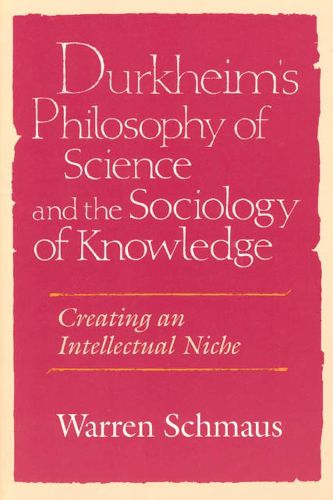Readings Newsletter
Become a Readings Member to make your shopping experience even easier.
Sign in or sign up for free!
You’re not far away from qualifying for FREE standard shipping within Australia
You’ve qualified for FREE standard shipping within Australia
The cart is loading…






In this demonstration of the link between philosophy of science and scientific practice, Warren Schmaus argues that Durkheim’s philosophy is crucial to his sociology. Through a reinterpretation of the relation between Durkheim’s major philosophical and sociological works, Schmaus argues that Durkheim’s sociology is more than a collection of general observations about society, it reflects a constructed theory of the meanings and causes of social life. Schmaus shows how Durkheim sought to make sociology more rigorous by introducing scientific methods of analysis and explanation into the study of society. Durkheim tried to reveal how implicit, commonly held beliefs actually govern people’s lives. Through an original interpretation of Durkheim’s landmark writings, Schmaus argues that Durkheim, in his empirical studies, refined both the methods of sociology and a theory about society’s shared knowledge and practices.
$9.00 standard shipping within Australia
FREE standard shipping within Australia for orders over $100.00
Express & International shipping calculated at checkout
In this demonstration of the link between philosophy of science and scientific practice, Warren Schmaus argues that Durkheim’s philosophy is crucial to his sociology. Through a reinterpretation of the relation between Durkheim’s major philosophical and sociological works, Schmaus argues that Durkheim’s sociology is more than a collection of general observations about society, it reflects a constructed theory of the meanings and causes of social life. Schmaus shows how Durkheim sought to make sociology more rigorous by introducing scientific methods of analysis and explanation into the study of society. Durkheim tried to reveal how implicit, commonly held beliefs actually govern people’s lives. Through an original interpretation of Durkheim’s landmark writings, Schmaus argues that Durkheim, in his empirical studies, refined both the methods of sociology and a theory about society’s shared knowledge and practices.